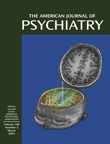Summer Birth and Deficit Schizophrenia
To the Editor: Brian Kirkpatrick, M.D., and co-authors (1) reported interesting findings that are in line with previous findings reported by the same research group. Taken together, these findings fit the suggestion that the deficit type of schizophrenia is associated with summer birth and has an etiopathophysiology separate from that of other types of schizophrenia. However, a problem with these findings is that they have not yet been replicated by others (e.g., 2, 3). On the occasion of the article by Dr. Kirkpatrick et al., we analyzed our own data from a follow-up study on schizophrenia with respect to the topic addressed by Dr. Kirkpatrick et al. (For a description of the study design, see reference 4.)
At the 15-year follow-up evaluation, we found that 50% of the patients had a deficit syndrome according to the criteria proposed by Dr. Kirkpatrick et al. As did Dr. Kirkpatrick et al. (1), we used four definitions of summer birth: May to August (definition 1), June to August (definition 2), June to July (definition 3), and July to August (definition 4). We analyzed the association between each of the four definitions of summer birth and the deficit type of schizophrenia. Logistic regression analyses revealed that none of the four definitions was predictive for that type of schizophrenia. The odds ratios and confidence intervals (CIs) were as follows—definition 1: odds ratio=1.41, 95% CI=0.44–4.51 (Wald χ2=0.34, df=1, p=0.56); definition 2: odds ratio=1.99, 95% CI=0.51–7.71 (Wald χ2=0.99, df=1, p=0.32); definition 3: odds ratio=1.39, 95% CI=0.28–6.83 (Wald χ2=0.16, df=1, p=0.67); definition 4: odds ratio=1.81, 95% CI=0.38–8.38; (Wald χ2=0.57, df=1, p=0.45). These findings are comparable with those obtained in two independent previous studies by our research group (5, 6), neither of which could demonstrate that there is an association between summer birth and the deficit type of schizophrenia. In conclusion and with regard to the fact that the association between summer birth and the deficit type of schizophrenia has only been shown by the studies of one research group but was not shown by the present analyses or by other previous studies (2, 3), the evidence concerning this association is still far from definitive.
1. Kirkpatrick B, Tek C, Allardyce J, Morrison G, McCreadie RG: Summer birth and deficit schizophrenia in Dumfries and Galloway, southwestern Scotland. Am J Psychiatry 2002; 159:1382-1387Link, Google Scholar
2. Dollfus S, Brazo P, Langlois S, Gourevitch R, Dassa D, Besse F, Van Der Elst A, Thibaut F, Delamillieure P, Chabot B, Guelfi JD, Petit M: Month of birth in deficit and non-deficit schizophrenic patients. Eur Psychiatry 1999; 14:349-351Crossref, Medline, Google Scholar
3. Rodrigo G, Lusiardo M, Briggs G, Ulmer A: Differences between schizophrenics born in winter and summer. Acta Psychiatr Scand 1991; 84:320-322Crossref, Medline, Google Scholar
4. Bottlender R, Sato T, Jäger M, Strauss A, Möller H-J: The impact of the duration of untreated psychosis prior to first psychiatric admission on the 15-year outcome in schizophrenia. Schizophr Res (in press)Google Scholar
5. Bottlender R, Möller HJ: Monthly birth rates in residual and paranoid schizophrenic patients (letter). Eur Psychiatry 2000; 15:227Crossref, Medline, Google Scholar
6. Bottlender R, Jäger M, Möller H-J: Month of birth in patients with deficit and non-deficit type of schizophrenia. Eur Psychiatry (in press)Google Scholar



